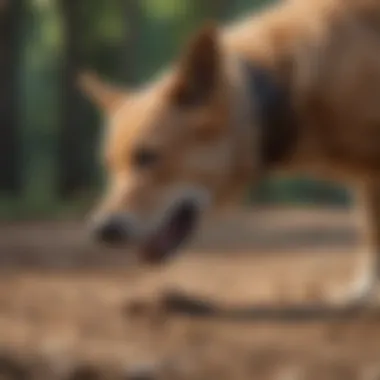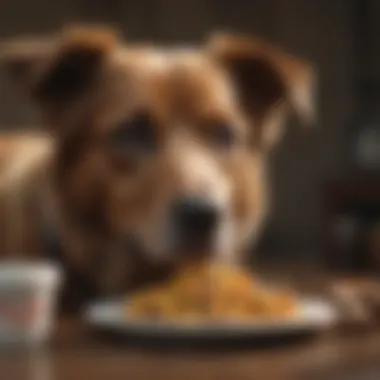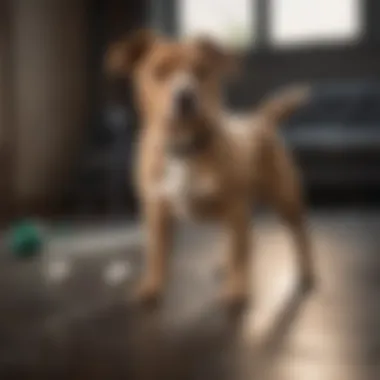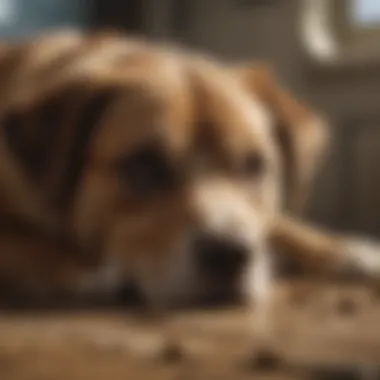Effective Strategies for Managing Coprophagia in Dogs: A Comprehensive Guide


Pet Care Essentials
Dogs are not just pets; they are members of the family. It is crucial to ensure their well-being by addressing any concerning behaviors they may exhibit, such as coprophagia - the act of eating stool. When your dog indulges in this unpleasant habit, it can be distressing for pet owners. Understanding the reasons behind coprophagia is the first step in effectively managing this behavior. Pet parents must pay close attention to their furry companions' nutritional needs, daily exercise regime, grooming requirements, and overall health and wellness. By providing proper care and meeting these essential needs, pet owners can help prevent unwanted behaviors like poop-eating.
Daily Nutrition Requirements
A balanced diet is the cornerstone of a healthy dog. Ensuring that your furry friend receives the right nutrients in their meals is vital in preventing deficiencies that may lead to coprophagia. Consultation with a vet or a professional pet nutritionist can help you develop a suitable diet plan tailored to your dog's unique requirements. From quality protein sources to essential vitamins and minerals, every component of your dog's diet plays a crucial role in their overall health and behavior.
Exercise and Playtime
Physical activity is key to keep your dog mentally engaged and physically fit. Regular exercise helps in reducing stress and anxiety, which are common triggers for behavioral issues like coprophagia. Engage your dog in daily walks, play sessions, and interactive games to channel their energy positively. In addition to keeping them physically healthy, exercise promotes a strong bond between you and your furry companion.
Grooming Tips
Maintaining proper hygiene is essential for your dog's well-being. Regular grooming sessions not only keep your dog's coat shiny and clean but also prevent skin infections and discomfort. Make grooming a part of your routine to promote healthy habits and ensure your dog feels comfortable and cared for at all times.
Health and Wellness Check-ins
Routine vet visits are crucial for monitoring your dog's health and catching any potential issues early on. Your veterinarian can provide valuable insights into your dog's overall well-being, offer preventive care measures, and address any concerns you may have regarding your dog's behavior. By prioritizing regular health check-ins, you can proactively manage your dog's health and address any underlying issues that may contribute to behaviors like coprophagia.
Understanding Coprophagia
Understanding Coprophagia is a crucial aspect of this article, delving into the reasons behind why dogs engage in this behavior. By exploring the causes of coprophagia, pet owners can gain valuable insights into their dog's actions, ultimately leading to a better understanding of how to address and prevent this behavior. The section aims to provide a comprehensive overview of coprophagia, shedding light on the various factors that may contribute to this habit and its potential impact on a dog's health and well-being.
Causes of Coprophagia
Natural Instincts
When examining the phenomenon of coprophagia, Natural Instincts emerge as a prominent factor. Dogs, by nature, have certain instincts that may drive them to consume feces. This primal behavior can be traced back to their ancestors, where scavenging for food was a survival instinct. Despite its adaptive advantages in the wild, this behavior poses risks in a domestic setting, affecting the dog's health and raising concerns for pet owners. Understanding the primal drive behind Natural Instincts is essential for addressing and mitigating coprophagia.


Behavioral Issues
Another significant aspect contributing to coprophagia is Behavioral Issues. Dogs may develop this behavior due to various psychological or behavioral problems, such as anxiety, boredom, or lack of stimulation. Behavioral Issues can manifest in different ways, with coprophagia being one of the potential outcomes. By delving into the underlying causes of Behavioral Issues, pet owners can tailor interventions to address the root of the problem effectively.
Medical Conditions
Medical Conditions play a vital role in understanding coprophagia in dogs. Certain health issues, such as malabsorption syndromes or enzyme deficiencies, can lead to nutrient deficiencies, prompting dogs to resort to eating feces. Recognizing the signs of Medical Conditions that contribute to coprophagia is crucial in providing appropriate medical attention and dietary management to improve the dog's overall health.
Impact on Dogs' Health
Exploring the Impact on Dogs' Health in relation to coprophagia sheds light on the nutritional concerns and potential risks associated with this behavior. Understanding how coprophagia affects a dog's health is paramount in implementing effective preventive measures and seeking appropriate veterinary care.
Nutritional Concerns
Nutritional Concerns arise due to the implications of coprophagia on a dog's diet and nutrient intake. When a dog consumes feces, it may be a sign of nutritional deficiencies or malnutrition. Addressing the underlying nutritional concerns is essential in ensuring that the dog receives a balanced diet that meets its requirements, reducing the likelihood of engaging in coprophagia.
Potential Risks
The Potential Risks associated with coprophagia can impact a dog's health in various ways. From ingesting harmful pathogens present in feces to encountering gastrointestinal issues, the risks involved in consuming feces are diverse. Pet owners need to be aware of these potential risks to take proactive measures in preventing their dog from engaging in this behavior.
Preventive Measures
Preventive measures play a crucial role in addressing the issue of coprophagia in dogs. By implementing proactive strategies, pet owners can significantly reduce the likelihood of this behavior and promote their canine companions' well-being. In this section, we will delve into the importance of preventive measures, considering various elements that contribute to preventing dogs from consuming feces. Pet parents must grasp the significance of a comprehensive approach that encompasses dietary adjustments, behavioral training, and environmental management to tackle coprophagia effectively.
Dietary Adjustments
High-Quality Food
High-quality food is a fundamental component of preventing coprophagia in dogs. The nutritional content and composition of a dog's diet play a pivotal role in deterring them from seeking out feces as an alternative source of nutrients. Pet owners should opt for premium dog food brands that offer a balanced blend of proteins, carbohydrates, fats, vitamins, and minerals. This dietary choice not only enhances the dog's overall health but also diminishes the likelihood of coprophagia occurrence. Additionally, high-quality food supports better digestion, leading to increased satiety and reduced cravings for unsuitable items.
Supplements


Supplements can complement a dog's diet and aid in deterring coprophagia behavior. Certain supplements provide essential nutrients that may be lacking in standard dog food formulas, promoting better nutrient absorption and overall health. Including supplements such as probiotics, digestive enzymes, or specific vitamins can address underlying nutritional deficiencies that might drive a dog to consume feces. However, it is crucial for pet owners to consult with a veterinarian before introducing any supplements to ensure compatibility with the dog's dietary requirements and health status.
Behavioral Training
Positive Reinforcement
Behavioral training through positive reinforcement is a valuable tool in modifying a dog's behavior towards coprophagia. By rewarding desirable behaviors with treats, praise, or play, pet owners can reinforce positive habits and discourage the consumption of feces. Dogs respond well to positive feedback, making this method effective in redirecting their focus towards more appropriate interactions. Consistency and patience are key when implementing positive reinforcement techniques, as gradual behavior changes and reinforcement of alternative behaviors are essential for long-term success.
Redirecting Behavior
Redirecting a dog's behavior away from feces involves guiding them towards more acceptable activities or objects. When a dog shows interest in consuming feces, redirecting their attention to engaging toys, interactive games, or stimulating exercises can interrupt the undesirable behavior pattern. Providing dogs with outlets for mental stimulation and physical activity not only distracts them from problematic behaviors but also fulfills their innate need for stimulation and interaction.
Environment Management
Cleaning Up
Maintaining a clean living environment is essential in managing coprophagia tendencies in dogs. Regularly cleaning up feces from the yard, litter box, or living spaces removes the temptation for dogs to engage in this behavior. Effective waste disposal and sanitation practices diminish the availability of feces as an accessible option for dogs, discouraging them from developing a habit of consumption.
Distraction Techniques
Utilizing distraction techniques can redirect a dog's attention and prevent them from indulging in coprophagia. Offering interactive toys, puzzle feeders, or engaging play sessions diverts the dog's focus to more constructive and rewarding activities. By incorporating mental stimulation and environmental enrichment, pet owners can effectively distract their dogs from engaging in undesirable behaviors such as consuming feces. These techniques not only discourage coprophagia but also promote healthy mental engagement and physical exercise, contributing to a well-rounded lifestyle for the dog.
Handling the Situation
When your beloved canine companion indulges in the unsavory act of consuming feces, it's crucial to address the situation promptly and effectively. ** Handling the Situation section equips pet owners with the necessary knowledge and strategies to tackle this behavior head-on. By focusing on immediate intervention, pet parents can mitigate the risks associated with coprophagia and ensure the well-being of their furry friends.
Immediate Steps
Stay Calm


In the face of a distressing scenario where your dog engages in coprophagia, the first immediate step is to ** wsoteb ). Maintaining a composed demeanor not only prevents escalating the situation but also helps in guiding your dog away from further consumption. The innate tendency for canines to pick up on their owner's emotional cues makes staying calm an invaluable tactic for de-escalating such incidents. While the urge to panic may be strong, portraying a sense of calmness communicates to your pet that the situation is under control, thereby minimizing stress levels and potentially curbing the behavior.
Remove Access
A critical aspect of addressing coprophagia is to eliminate access to feces. ** mBobaje cAess includes keeping outdoor spaces clean and disposing of waste promptly. By restricting your dog's ability to reach fecal matter, you reduce the likelihood of repeated incidents. Removal of temptation plays a significant role in behavior modification, as it interrupts the cycle of reinforcement associated with this undesirable behavior. However, it's essential to combine this tactic with positive reinforcement to reiterate the preferred actions and discourage future episodes of coprophagia.
Consulting a Vet
Health Checkup
Prioritizing a health checkup for your dog after an episode of coprophagia is paramount. This step allows ** tou yo ensure there are no underlying medical conditions contributing to this behavior. A vet can conduct a thorough examination to identify any digestive issues, nutritional deficiencies, or parasites that may be influencing your dog's dietary habits. By addressing potential health concerns early on, you can not only manage coprophagia effectively but also safeguard your pet's overall well-being.
Professional Advice
Seeking professional advice from a vet or animal behaviorist can provide invaluable insights into addressing coprophagia. ** Professian plotenessi Advice involves tailored strategies based on your dog's specific needs and behavioral patterns. Professionals can offer personalized recommendations on dietary changes, training techniques, and environmental modifications to curb coprophagia. Their expertise and experience play a crucial role in devising a comprehensive plan to tackle this challenging behavior and enhance the quality of life for your furry friend.
Additional Tips
Diving deep into the intricacies of addressing coprophagia in dogs, the Additional Tips section serves as a crucial component of this comprehensive guide. Pet owners must grasp the significance of closely monitoring and supervising their dogs to ensure their well-being. Offering insights into advanced strategies for preventing and managing coprophagia, these tips encompass various aspects ranging from nutrition to behavior modification. By incorporating the suggestions provided in this section, pet parents can effectively navigate through this challenging behavior.
Supervision and Monitoring
Close Obervsation
In the realm of pet care, Close Observation emerges as a fundamental practice imperative for mitigating coprophagia among dogs. This meticulous approach involves carefully monitoring the dog's behavior to identify triggers and patterns associated with poop consumption. By keenly observing the pet's actions, pet owners can develop a deeper understanding of the underlying causes behind this behavior. The close scrutiny allows for timely intervention and the implementation of corrective measures to address coprophagia effectively. Despite its meticulous nature, Close Observation stands out as a preferred technique due to its ability to uncover subtle changes in behavior that could indicate deeper issues.
Stracking Progress
Tracking Progress plays a pivotal role in the holistic management of coprophagia in dogs. This systematic approach involves documenting the dog's progress in response to preventive and corrective measures implemented. By maintaining detailed records of the pet's behavior and dietary habits, pet owners can track improvements or setbacks over time. Such tracking facilitates informed decision-making regarding the effectiveness of strategies employed and provides valuable insights into the dog's overall well-being. While requiring consistent effort, Tracking Progress proves indispensable in assessing the efficacy of interventions and making informed adjustments.
Seeking Support
Equally essential is Seeking Support when dealing with coprophagia in dogs. Community Resources offer a wealth of information and shared experiences from fellow pet owners facing similar challenges. Engaging with online forums, support groups, and reputable websites can provide valuable guidance and emotional support throughout the journey of addressing coprophagia. These resources serve as a platform for exchanging insights, seeking advice, and realizing that pet owners are not alone in dealing with this behavior. Despite potential drawbacks such as conflicting opinions, Community Resources remain a valuable source of solidarity and shared knowledge.
Pet Behavriosits
Harnessing the expertise of a Pet Behaviorist can be a game-changer in addressing coprophagia effectively. These professionals possess specialized knowledge in animal behavior and offer tailored interventions to tackle specific issues. Through a thorough assessment of the dog's behavior and environmental factors, a Pet Behaviorist can provide personalized strategies to modify the pet's conduct. Their guidance empowers pet owners with the tools and techniques needed to address coprophagia comprehensively. Although requiring financial investment, the services of a Pet Behaviorist prove invaluable in achieving long-term behavioral changes in dogs.







